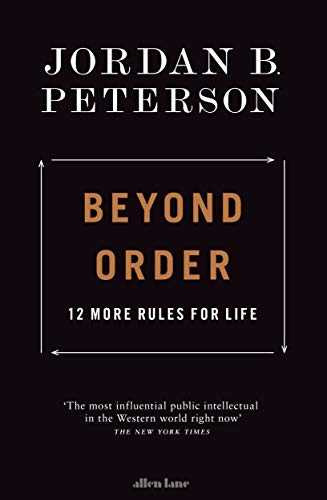James Bradshaw
mercatornet.com
James Bradshaw works for an international consulting firm based in Dublin, and has a background in journalism and public policy. Outside of work, he writes for a number of publications, on topics including politics, history, culture, film and literature.
Beyond Order: 12 More Rules for Life
by Jordan Peterson. 2021, 432 pages
The relatively small amount of attention which has been devoted to Jordan Peterson’s new book – Beyond Order, published in March – is somewhat remarkable.
In the last five years, the Canadian professor developed a worldwide fanbase which peaked following the publication of his bestseller 12 Rules for Life: An Antidote to Chaos and the subsequent international speaking tour.
Yet three years on, the publicity has dampened dramatically. Covid accounts for some of this, but the broader issue is the string of misfortunes which have befallen the Peterson family and Jordan’s descent into benzodiazepine addiction which resulted in him being placed in an induced coma.
Though he is gradually recovering, recent interviews show the toll this has taken — and Beyond Order is clearly a book born out of suffering.
As with his previous work, Peterson draws on his experiences as a clinical psychologist as well as his impressive knowledge of mythology, literature and world religions.
While his previous “12 Rules” focused on the dangers of chaos, Peterson explains that the overarching theme here is “how the dangers of too much security and control might be profitably avoided.”
Many are sceptical of the Peterson phenomenon. There is, it must be said, relatively little in his message which is entirely original (something which might be lost on younger readers at an early stage of their literary development).
Indeed, what he teaches readers consists of what others would regard as common sense, in an era where this is no longer so common.
Furthermore, he seems admirably comfortable with this role. “Helping people bridge the gap between what they profoundly intuit but cannot articulate seems to be a reasonable and valuable function for a public intellectual,” he writes.
And this message is unquestionably a positive one: something which parents, schools and other social institutions should be instilling in the young but which many are reluctant to do.
Peterson correctly points out that there has been an excessive focus on rights over the last half century which has not been accompanied by a corresponding emphasis on responsibilities.
Urging his readers to consider the benefits of placing themselves at the bottom of a hierarchy, he calls on them to embrace what is difficult and that which brings with it responsibilities.
“Life,” he writes, “becomes meaningful in precise proportion to the depths of the responsibility you are willing to shoulder.” In a similar vein, he draws attention to the “strange and paradoxical fact that there is a reciprocal relationship between the worth of something and the difficulty in accomplishing it.”
Though he is often described as a conservative, one of his lessons is “Abandon Ideology” of the Left or the Right, and he carefully describes the importance of achieving a balance between social institutions and creative achievement — or putting it another way, the conservative instinct and the liberal one.
Though the cultural references (Harry Potter, etc) can sometimes bore, the value of Peterson’s work should not be dismissed, and others who are concerned about societal tumult need to reflect on why he is such a good communicator.
Christian leaders should be especially interested, as this nominal Christian does not shy away from drawing upon Scripture to make his case to readers who belong to the most irreligious generation in history.
After experiencing such physical and emotional pain, his reflections on suffering carry a particularly deep religious imprint, as he writes of how the cross constitutes the “burden of life” which we cannot avoid.
Referencing Christ’s words on the cross (“My God, my God, why hast thou forsaken me?”), Peterson reminds his readers that this burden “can become so great that even God Himself can lose faith when confronted with the unbearable reality of injustice, betrayal, suffering and death.”
Possessing a vast pulpit which most clerics would envy, Peterson is effective in preaching a powerful message to a lost generation in need of his guidance from someone who poses searching questions and asks his audience to ask more of themselves.
Please share this article so that others can discover The BFD.


